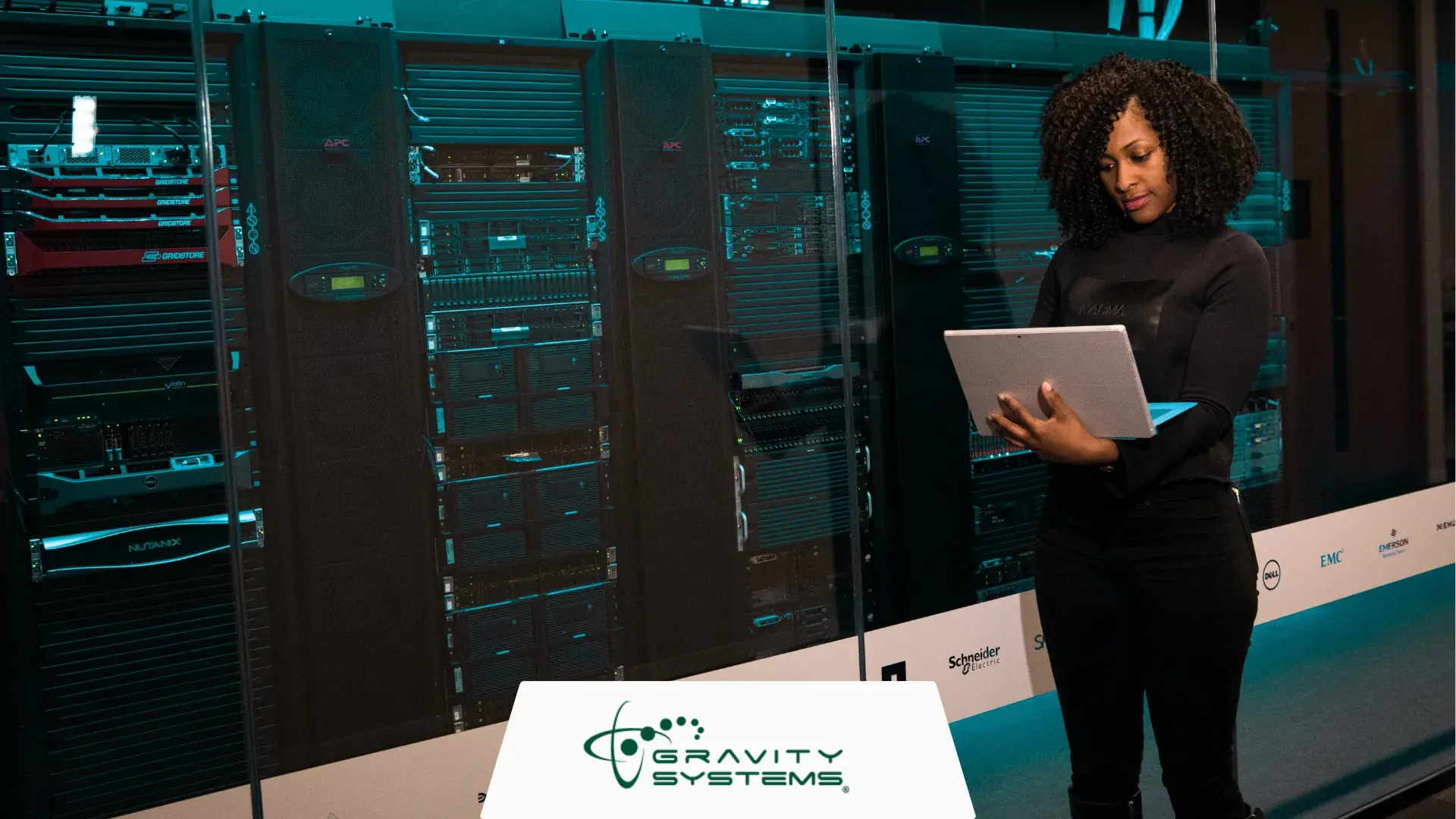Why Cloud Computing Is Important: The Smart SMB’s Guide to Scaling, Securing, and Succeeding
Every minute your business runs on outdated infrastructure, you're bleeding time, money, and opportunity. For small and mid-sized businesses, the stakes couldn’t be higher. According to recent research, 60% of SMBs that suffer a cyberattack go out of business within six months
As Kent Morris, President of Gravity Systems, says, “Cloud computing can be a smart upgrade—it’s the competitive edge that helps SMBs scale, protect, and modernize fast. However, a modern on-prem solution might also fit the bill.”
If your systems are slow, your teams are stuck in silos, or your costs are spiraling—cloud computing can change the game. But the real question is: can you afford not to move?
Let’s break down exactly why cloud computing is no longer a ‘nice-to-have’—but a business necessity.
Don’t let outdated IT hold your business back.
At Gravity Systems, we help SMBs like yours take full advantage of the cloud—securely, strategically, and with zero guesswork.
Get Started Now
The Real Cost of Legacy IT (And Why It’s Holding You Back)
Running an on-premise setup may feel familiar, but it’s bleeding your budget and your productivity.
- High maintenance costs: Servers break, licenses expire, and patches pile up.
- Scalability struggles: Need more space or users? It’s either a huge delay or a costly upgrade.
- Security gaps: Legacy systems are a hacker’s favorite playground.
Forbes reports that SMBs adopting cloud save up to 30% on IT operations over time. It's not just about savings—it's survival.
Cloud Computing 101—What It Is and Why It’s Crucial
Cloud computing means accessing your software, storage, and computing power over the internet instead of through physical servers at your office.
Three common types:
- IaaS (Infrastructure): Like renting hardware.
- PaaS (Platform): Build apps without managing infrastructure.
- SaaS (Software): Use apps like Microsoft 365 or Salesforce in the cloud.
The importance of cloud computing lies in giving SMBs the tools of large enterprises, without the baggage.
5 Tangible Benefits of Cloud Computing for SMBs
Cloud computing isn’t just a tech upgrade—it’s a business growth engine. Here’s how small and midsize businesses (SMBs) like yours can gain a competitive edge from day one.
1. Lower IT Costs Without Sacrificing Performance
Say goodbye to sky-high capital expenditures. Traditional infrastructure requires upfront investment in servers, networking equipment, licensing, and ongoing maintenance—all of which can bleed your budget dry.
With cloud computing, you pay only for what you use. It’s like switching from owning your own power grid to just paying for the electricity you need.
- No surprise bills—subscription-based pricing models offer predictability.
- Automatic updates—no more expensive upgrade cycles.
- Shared infrastructure—cut costs by using top-tier platforms built for scale.
According to a Gartner study, Businesses that migrate to the cloud cut IT costs by 20–30% annually.
2. Remote Accessibility That Actually Works
Need to support a hybrid or fully remote workforce? Cloud makes it seamless.
Your teams can access files, applications, and collaboration tools from anywhere with an internet connection. Whether working from home, client sites, or across time zones—productivity doesn’t have to pause.
- Built-in collaboration tools like Microsoft Teams, Google Workspace, and Slack integrate effortlessly.
- Real-time file sharing reduces back-and-forth emails.
- Secure access control ensures the right people see the right data—nothing more.
Cloud platforms are built from the ground up for a mobile, flexible world. Cloud-enabled mobility is now a key driver for business continuity and innovation across industries.
|
More resources you might like: |
3. Scalability on Demand—Without Growing Pains
If your business is growing—or about to—cloud computing gives you room to breathe.
Need to onboard 10 new employees next week? Want to launch a new branch next month? Just log in and scale up—no delays, no long procurement processes.
- Add users, storage, and software licenses instantly.
- Avoid overbuying upfront capacity you may never use.
- Handle seasonal or project-based spikes in demand effortlessly.
And when demand dips, you scale back just as easily, making your IT resources as agile as your business strategy.
Our experts always say, “Cloud computing removes the guesswork from capacity planning.”
4. Improved Security That’s Enterprise-Grade
Think your business is too small to be a target? Think again. SMBs are now a prime target for cyberattacks—precisely because many lack robust security.
Cloud computing offers access to the kind of layered security architecture that would cost a fortune to replicate on-premise.
- End-to-end encryption keeps your data protected in transit and at rest.
- Firewalls, threat monitoring, and intrusion detection are built in.
- Role-based access and multi-factor authentication guard against internal and external threats.
Top providers like Gravity Systems, Microsoft Azure, and Google Cloud maintain global security teams and compliance certifications such as ISO 27001, SOC 2, HIPAA, and more, so you can sleep a little easier.
5. Business Continuity You Can Count On
What happens if your building floods? Or if ransomware locks your systems down? Without cloud, recovery could take days—or worse, not at all.
With cloud, backups happen automatically, and recovery is often just a few clicks away.
- Automated backups ensure you’re always protected—even if someone forgets to hit “Save.”
- Geo-redundancy stores your data in multiple locations.
- Faster recovery times mean fewer hours (or days) lost to downtime.
According to IBM’s Cost of a Data Breach report, the average breach costs SMBs $4.88 million, but businesses with cloud-based recovery systems reduce downtime and costs significantly.
In a world where every minute of downtime equals lost revenue and reputation, cloud-based continuity isn’t a luxury—it’s a necessity.

Common Objections Debunked: “Isn’t Cloud Risky?”
We get it—migrating to the cloud feels like a big leap. But most of the fears around cloud computing stem from outdated perceptions. Let’s tackle the top objections head-on:
“I’ll lose control of my data.”
This is the most common (and most understandable) fear. After all, if your data isn't sitting on a server in your office, how can you be sure it's safe?
Here’s the truth: you don’t lose control—you gain clarity. Leading cloud providers offer detailed audit logs, real-time access controls, and full visibility into where your data lives and who accesses it.
- You set the rules with role-based access control (RBAC).
- You can restrict, monitor, or revoke access at any time.
- Many platforms offer compliance dashboards and geo-location data residency settings for extra assurance.
And because all changes are logged, you have a clear trail for accountability—something many on-premise systems simply don’t offer.
“What about downtime?”
Uptime is everything, but ironically, most on-premise servers are far less reliable than their cloud counterparts.
Top cloud providers like AWS, Microsoft Azure, and Google Cloud invest billions into redundancy, failover architecture, and real-time monitoring. The result? Uptime that exceeds 99.99%, which translates to just minutes of downtime per year.
Compare that to an SMB server closet with a single point of failure—if your power, hardware, or IT staff goes down, so does your business.
Cloud gives you not only more uptime—but the peace of mind of automatic failover and instant backup restoration.
“Cloud is too complicated.”
To a non-technical team, cloud can sound like a black box of acronyms, dashboards, and unknowns. And yes—if you’re doing it alone, it can feel overwhelming.
But that’s exactly why you don’t have to do it alone.
A seasoned managed IT partner like Gravity Systems handles the entire process for you—from migration and security to ongoing monitoring and support.
- We tailor the setup to your business needs, not the other way around.
- We provide training and documentation for your team.
- We handle updates, security patches, and vendor management behind the scenes.
So while the cloud might seem complicated, with the right MSP by your side, it becomes a smooth, guided experience focused on results—not jargon.
Comparison Table: On-Premise vs Cloud
|
Feature |
On-Premise |
Cloud-Based |
|
Upfront Cost |
High (hardware/software) |
Low (subscription-based) |
|
Scalability |
Manual and expensive |
Instant and affordable |
|
Maintenance |
In-house staff required |
Vendor-managed |
|
Security |
Varies; responsibility on you |
Enterprise-level with compliance |
|
Accessibility |
Office-bound |
Anywhere with internet access |
|
Backup & Recovery |
Manual or periodic |
Automated and real-time |
Ready to Level Up? Partner with Gravity Systems
Cloud computing isn’t just the future—it’s the foundation for how SMBs scale, secure, and succeed.
Gravity Systems is your go-to managed IT provider for cloud solutions tailored to small and midsize businesses. With custom onboarding, real-time support, and strategic planning, we help you migrate smoothly and operate confidently in the cloud.
Ready to make the move? Schedule a free consultation with Gravity Systems.
|
Discover Trusted Cloud Services in Austin, Texas |







